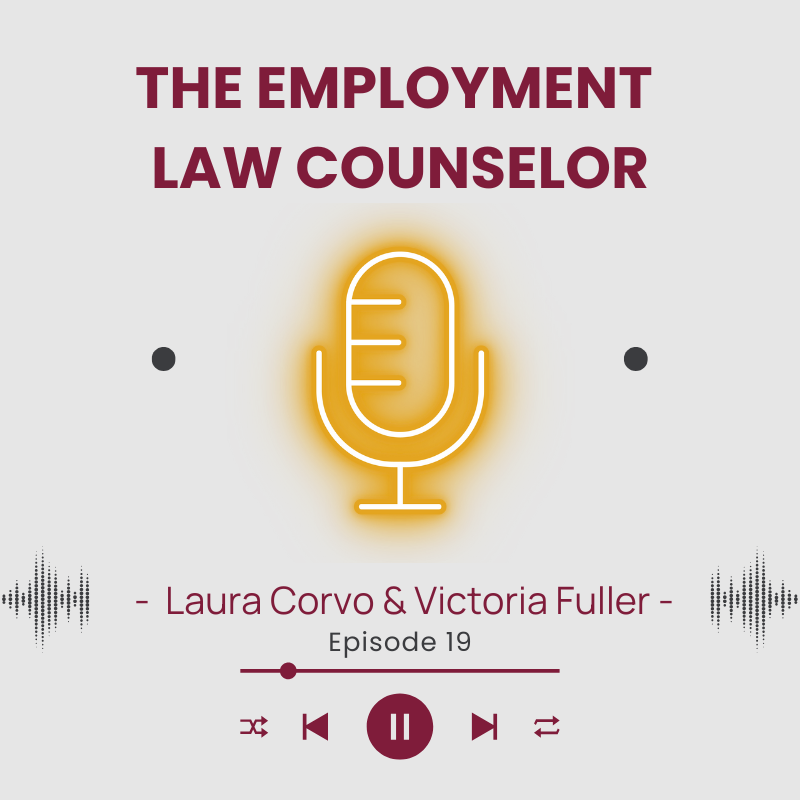December 13, 2021
Accommodating Sincerely Held Religious Beliefs Which Conflict with Vaccination Policies


Laura Lapidus, Esq., is a risk control director for CNA, managing the development and delivery of employment practices liability (EPL) and management liability risk control products and services. She also is responsible for coordinating the delivery of risk control resources for CNAs financial institutions policyholders. Laura has more than 30 years of experience in employment law. She has taught dozens of CNAs School of Risk Control Excellence (SORCE) courses and webinars and has written various articles on employment practices and other matters. Prior to CNA, Laura spent ten years managing EPL and management liability claims for other carriers. She also served as in-house employment counsel for Sbarro, Inc., a restaurant company, as in-house employment counsel for the Internal Revenue Service, and practiced at a litigation boutique, focusing on employment law and commercial litigation. Laura also serves as the co-chair of AVID@CNA (Advocacy for Visible and Invisible Disabilities), one of CNAs Employee Resource Groups (ERGs). She is also a member of Associated Builders and Contractors (ABCs) Inclusion, Diversity, and Equity Committee and leads ABCs Disability Diversity Resource Group (DRG).
As the COVID-19 pandemic continues, employers are grappling with policies and practices aimed at keeping their workers healthy and safe. To that end, many employers have implemented or are considering mandatory vaccination policies. In its guidance, What You Should Know About Covid-19, the ADA, Rehabilitation Act and Other EEO Laws, the Equal Employment Opportunity Commission (EEOC) indicates that an employer mandated vaccination policy does not, on its face, violate federal equal employment laws if exceptions exist for employees who decline vaccinations because of a disability or because of a sincerely held religious belief. [1] In October 2021, the EEOC published additional guidance which addresses employer accommodations for sincerely held religious beliefs which prevent employees from receiving a COVID-19 vaccination.[2]
Title VII of the Civil Rights Act of 1964 (Title VII), as well as many state and local anti-discrimination laws, prohibits employment discrimination based on religion.[3] Title VII also provide applicants and employees (herein referred to collectively as employees) with the right to request a reasonable accommodation from an employer policy or practice that conflicts with the employees sincerely held religious beliefs, practices, or observances.[4] An employer is not required to grant an accommodation if the employer shows that it cannot reasonably accommodate an employee’s religious beliefs, practices, or observances without undue hardship to its operations.[5] Although employers may be familiar with the concept of reasonable accommodation of individuals with disabilities, accommodating employees sincerely held religious beliefs typically is not encountered as frequently. While the concepts underlying both are similar, it is important to understand the considerations in accommodating sincerely held religious beliefs, and how they differ from those of accommodating disabilities. Employers should work with experienced employment counsel when they receive religious accommodation requests in order to mitigate the risk of religious discrimination claims.
Accommodation Requests
The EEOC notes that an employee who wants an exception to an employer’s vaccination mandate because it conflicts with their sincerely held religious belief must notify the employer of such. The employee does not need to specifically mention Title VII, or use the term accommodation.[6] Rather, the employee must simply advise that their sincerely held religious beliefs conflict with the employers vaccination requirement, or with getting a particular vaccine (and that the employee wishes to wait until an alternative version or specific brand of COVID-19 vaccine is available), or any other policy or procedure.[7] The EEOC suggests that employers should advise employees regarding whom to contact, and the procedures to use, to request a religious accommodation.[8] Managers should be trained to recognize potential accommodation requests and to forward them to the individual or department responsible for handling such requests.
Religious Beliefs
Title VII defines religion broadly and protects nontraditional religious beliefs, even those that are uncommon or with which employers may not be familiar.[9] An employer may ask the employee to explain how their religious beliefs conflict with the employer’s vaccination policy. The EEOC suggests that employers should assume that a request for a religious accommodation is based on a sincerely held religious belief.[10] Although an employer may question the employee if it has an objective basis for questioning either the religious nature or the sincerity of the belief, only a limited inquiry is permitted.[11] The EEOC notes that newly adopted or seemingly inconsistent observances or practices still may be sincerely held, and that a religious belief may be sincerely held even if it deviates from the commonly followed tenets of the employees religion or stated beliefs of religious leaders, or because the employee adheres to some, but not all, common religious practices.[12] Title VII does not, however, protect sincerely held beliefs that are social, political, or personal preferences.[13]
Reasonable Accommodation
Once the employer determines that an employee has a sincerely held religious belief, the employer should engage in information sharing with the employee, similar to the interactive process that is used under the ADA to determine if a reasonable accommodation exists.[14] The EEOC suggests that if an accommodation does not appear to exist, the employer should consider having a discussion with the employee to determine potential effective accommodations.[15]
An employer is not required to provide the accommodation that an employee requests.[16] However, an employer’s accommodation will not be considered reasonable if a more favorable accommodation is provided to other employees for non-religious purposes, or if it requires the employee to accept a loss of a benefit or privilege of employment, such as pay, and there is an alternative accommodation that does not do so.[17] The EEOC urges employers to consider all possible alternatives for accommodations, and encourages employers to rely on the Centers for Disease Control (CDC) recommendations to assist in determining whether an accommodation exists that would not be an undue hardship.[18]
Undue Hardship
An employer does not need to accommodate an employees sincerely held religious beliefs if doing so would cause the employer undue hardship.[19] Under Title VII, the Supreme Court held that requiring an employer to bear more than a de minimis, or a minimal, cost to accommodate an employees religious belief is an undue hardship.[20] The undue hardship standard under Title VII is lower than the undue hardship standard under the Americans with Disabilities Act (ADA), which requires employers to show that the accommodation would cause significant difficulty or expense, 42 U.S.C. 12111(10)(A).[21]
When analyzing undue hardship, employers may consider monetary costs as well as the burden on the employers business, which may include the risk of the spread of COVID-19 to other employees or to the public. The EEOC notes that undue hardship has been found in cases where the accommodation would impair workplace safety, diminish efficiency in other jobs, or cause coworkers to carry the accommodated employees share of potentially hazardous or burdensome work.[22]
Employers should consider the particular facts and circumstances of each accommodation request and rely on objective considerations when determining whether a reasonable accommodation is possible. An employer may consider many things, including whether the employee works outdoors or indoors, works in a solitary or group setting, or has close contact with others, particularly if that close contact is with medically vulnerable individuals.[23] The employer may also consider the cumulative cost or burden of all of the employees who are seeking similar accommodations, but it may not reject an accommodation as an undue burden merely because of a speculation that others will request similar accommodations.[24] Employers should ensure that the interactive process and the considerations relied upon are well documented.
Conclusion
Requests for religious accommodations have become more commonplace during the COVID-19 pandemic, particularly in response to employer mandated vaccination policies. While there are similarities between accommodating a sincerely held religious belief and accommodating a disability, employers should be aware of the differences as well. Employers should work with experienced employment counsel to understand their obligations under Title VII in order to mitigate the risk of religious discrimination claims.
The information, examples and suggestions presented in this material have been developed from sources believed to be reliable, but they should not be construed as legal or other professional advice. CNA accepts no responsibility for the accuracy or completeness of this material and recommends the consultation with competent legal counsel and/or other professional advisors before applying this material in any particular factual situations. This material is for illustrative purposes and is not intended to constitute a contract. Please remember that only the relevant insurance policy can provide the actual terms, coverages, amounts, conditions and exclusions for an insured. All products and services may not be available in all states and may be subject to change without notice. CNA” is a registered trademark of CNA Financial Corporation. Certain CNA Financial Corporation subsidiaries use the “CNA” trademark in connection with insurance underwriting and claims activities. Copyright 2021 CNA. All rights reserved.
[1] What You Should Know About COVID-19 and the ADA, the Rehabilitation Act, and Other EEO Laws | U.S. Equal Employment Opportunity Commission (eeoc.gov). Although Title VII applies to employers with fifteen or more employees, various state and local laws also prohibit discrimination based upon religion and provide the right to reasonable accommodation of sincerely held religious beliefs. As state and local laws may have a lower employee threshold, employers should consult with local employment counsel to determine which laws are applicable to their particular circumstances.
[2] What You Should Know About COVID-19 and the ADA, the Rehabilitation Act, and Other EEO Laws | U.S. Equal Employment Opportunity Commission (eeoc.gov).
[3] 42 U.S. Code 2000e2 – Unlawful employment practices | U.S. Code | US Law | LII / Legal Information Institute (cornell.edu)
[4] See EEOC Guidance, Section 12: Religious Discrimination and EEOC Guidelines on Discrimination Because of Religion.
[5] Id.
[6] What You Should Know About COVID-19 and the ADA, the Rehabilitation Act, and Other EEO Laws | U.S. Equal Employment Opportunity Commission (eeoc.gov), Question L1.
[7] Id.
[8] Id.
[9] 42 U.S. Code 2000e(j) – Definitions | U.S. Code | US Law | LII / Legal Information Institute (cornell.edu)
[10] EEOC Compliance Manual, Section 12-I.A.2: Religious Discrimination (credibility and sincerity) (the sincerity of an employees stated religious belief is usually not in dispute and is generally presumed or easily established(internal citation omitted)).
[11] Id. The EEOC notes the employers objective basis may rely on factors such as whether:
- the employee has acted in a manner markedly inconsistent with the professed belief,
- the accommodation sought is a benefit that is likely to be sought for nonreligious reasons,
- the timing of the request renders it suspect, such as when it follows an earlier request by the employee for the same benefit for secular reasons, or
- the employer has reason to believe the accommodation is sought for reasons other than religious ones.
The employer otherwise has reason to believe the accommodation is not sought for religious reasons
[12] Id.
[13] Id.
[14] Section 12: Religious Discrimination | U.S. Equal Employment Opportunity Commission (eeoc.gov)
[15] Id.
[16] What You Should Know About COVID-19 and the ADA, the Rehabilitation Act, and Other EEO Laws | U.S. Equal Employment Opportunity Commission (eeoc.gov), Question L5.
[17] Id.
[18] Id. Question K2 provides employers with a non-inclusive list of potential accommodations, such as requiring an unvaccinated employee in the workplace to wear a face mask, work at a distance from others, work a modified shift, get periodic tests for COVID-19, be permitted to telework, or accept a reassignment.
[19] 42 U.S. Code 2000e(j) – Definitions | U.S. Code | US Law | LII / Legal Information Institute (cornell.edu)
[20] Trans World Airlines, Inc. v. Hardison, 432 U.S. 63, 84 (1977).
[21] Id.
[22] What You Should Know About COVID-19 and the ADA, the Rehabilitation Act, and Other EEO Laws | U.S. Equal Employment Opportunity Commission (eeoc.gov), Question L3.
[23] Id.
[24] Id.
News Type
PLUS Blog
Business Line
Employment Practices Liability (EPL)
Topic
Professional Liability (PL) Insurance
Contribute to
PLUS Blog
Contribute your thoughts to the PLUS Membership consisting of 45,000+ Professional Liability Practitioners.
Related Podcasts

The Employment Law Counselor Episode 19
Reductions in Risk for Reductions in Force In this episode of The…
Related Articles

Navigating EPL Trends Across North America: Key Risks and Insights for 2025 Webinar Recap
Employment Practices Liability (EPL) risks are becoming increasingly complex as workplace norms…

Mitigating the Risks of Reductions in Force: Lessons from The Employment Law Counselor
In the latest episode of The Employment Law Counselor, hosts Victoria Fuller…

Employment Discrimination and Retaliation – Best Practices to Avoid Headaches
There is little doubt that an employment-discrimination lawsuit is an unsettling experience…
